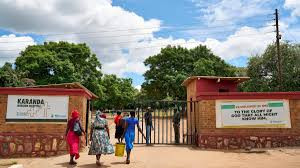
MUTARE –— Feruka pipeline no longer has the capacity to adequately supply fuel to the whole country due to its aged state.
BY CLAYTON MASEKESA
The pipeline, built in 1966, runs between Beira in Mozambique and Harare.
Companhiado De Pipeline Mozambique-Zimbabwe (CPMZ) station manager, Henry Saungweme told Energy minister Dzikamai Mavhaire last week during the tour of Feruka Refinery that the 408km long pipeline needed to be upgraded.
The Zimbabwe government owns 21 kilometres of the pipeline while the Mozambican government through its company, CPMZ, controls the rest. “Forensic studies have showed that the pipeline is now aged,” said Saungweme. “The pipeline is no longer able to meet the fuel demands in the country because the pipeline is aged.”
Saungweme also said electricity blackouts were affecting operations resulting in the reduction of the quantity of fuel that is pumped to Mutare from Beira.
“Whenever there are blackouts, we use diesel power which is less efficient and this affects the quantity of fuel that we pump to Mutare,” he explained.
The government last year introduced a US$0,04 per litre levy on fuel importers using road transport to bring fuel into the country in an effort to induce them to use the Beira-Feruka pipeline.
However, the move has not produced the desired results as fuel companies have continued shunning the pipeline.
Mavhaire said the government was considering a second pipeline between Beira and Harare.
“The government will initiate studies on the construction of the second pipeline,” he said. “We are already pursuing bilateral procedures with Mozambique with a view of coming up with a second pipeline.”
Already, said Mavhaire, a number of investors have put forward proposals for building a second pipeline.
Among them is Mining Oil and Gas Services, a South African-based company, which intends to construct a multi-billion dollar fuel pipeline linking Beira and three southern African countries through Zimbabwe.
The Feruka pipeline pumps 6,5 million litres of fuel per day but it has a maximum capacity of 8 million litres per day.










